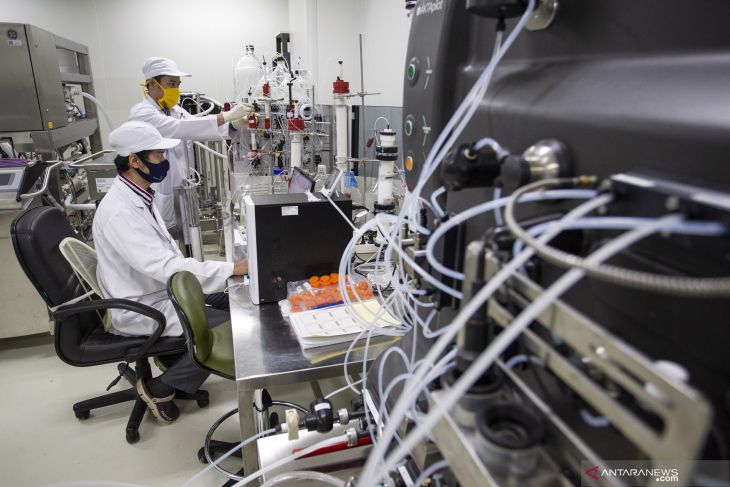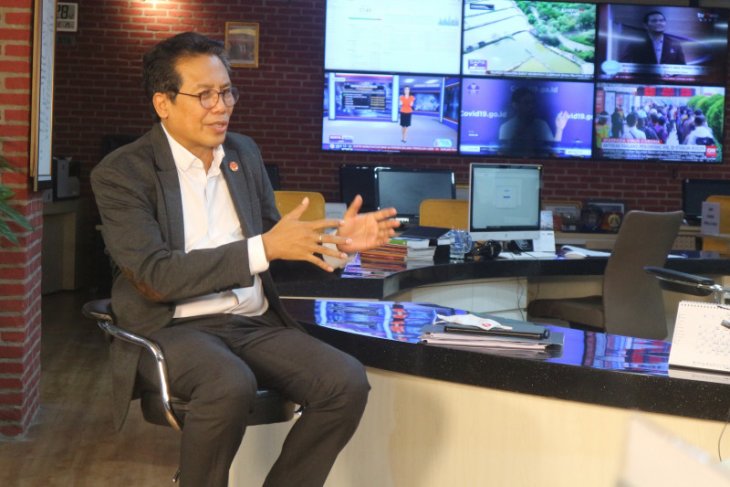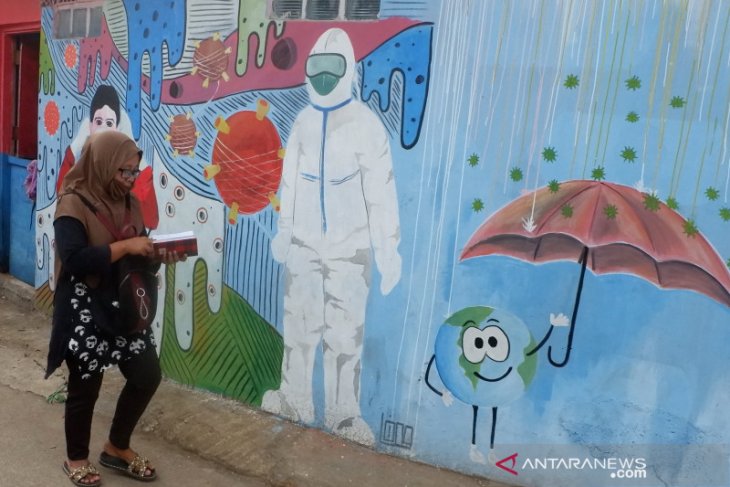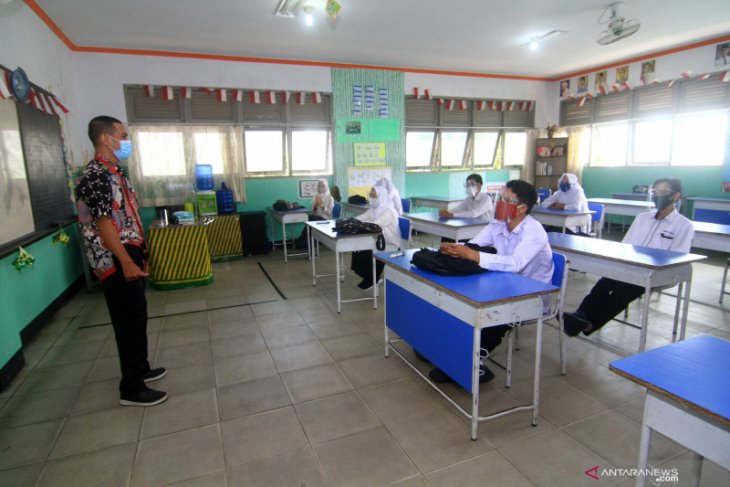Live Streaming
Program Highlight
Company Profile

Ani Hasanah
August
COVID-19 Vaccines Included in Indonesia's Research Priorities: Government

Photo Archive. Researchers are working to develop a Red and White vaccine to tackle the COVID-19 pandemic at Bio Farma, Bandung, West Java, Wednesday (12/8/2020). ANTARA FOTO/Dhemas Reviyanto/wsj.
Research and Technology Minister/ National Research and Innovation Agency Head Bambang P. S. Brodjonegoro affirmed that research on vaccines and COVID-19 drugs was included in the national research priorities for the 2020-2024 period.
"For tackling the COVID-19 pandemic, we should immediately put in place a vaccine apart from OMAI, or original Indonesian modern medicine, both phyto-pharmacy and standardized herbal medicines (OHT), including supplements that are currently being tested by LIPI at the Wisma Atlet Hospital," he noted in Jakarta, Thursday, during a virtual press conference to discuss national research priorities.
Brodjonegoro affirmed that the 2020-2024 national research priorities currently also encompass research and development of medical devices that earlier garnered less attention.
The government is making changes in the structure of the 2020-2024 national research priorities, including research on the prevention of COVID-19.
"Of course, medical devices should not be forgotten since they received less attention in the early national research priorities. However, with requirements emerging from the COVID-19 pandemic, we believe that Indonesia must start innovating to develop various types of medical devices required by society, in general," Brodjonegoro noted.
Changes in the 2020-2024 national research priorities also encompass research on the development of short- and medium-range passenger aircraft in addition to the N219 aircraft as well as the development of N245 and R80 aircraft.
In addition, the technology to develop flat plate ships for fishermen is also included in national research priorities.
The 2020-2024 national research priorities include 49 research products, with attention to food, energy, health, transportation, engineering, defense and security, maritime affairs, social humanities, education, cultural arts, and multi-disciplinary, or cross-sectoral.
Four of the 49 national research priorities developed by the Ministry of Research and Technology/BRIN and in the process of entering into national strategic projects comprise red and white catalysts, integrated industrial salt, unmanned aerial vehicle (UAV) or Medium Altitude Long Endurance (PUNA MALE) type named the Black Eagle, and the N219 amphibious aircraft. (ANTARA)
August

Fadjroel Rachman, Presidential spokesman. ANTARA/Rangga Pandu Asmara Jingga
The Indonesian government bestowed the "Bintang Jasa" (Stars of Service) awards to honor doctors and nurses, who died while fulfilling their duties to handle the coronavirus disease (COVID-19) pandemic.
"This awards mark our deep sorrow (for the fallen health workers) and highest respect for all medical personnel, who are at the forefront in the fight of the COVID-19 pandemic in Indonesia," presidential spokesman Fadjroel Rachman stated in Jakarta on Thursday.
President Joko Widodo presented the 22 Stars to the families of the 13 doctors and nine nurses, who died in the line of duty.
Of the 22 medical personnel, nine were honored with the Pratama (Primary) Star awards, while 13 were presented the Nararya (Glorified) Stars.
Meanwhile, as of August 1, 2020, at least 72 doctors had died of COVID-19 in Indonesia, Halik Malik, a spokesman of the Indonesian Medical Association (IDI), told Kompas daily.
President Joko Widodo (Jokowi) announced the country's first confirmed COVID-19 cases on March 2, 2020.
On Aug 8, 2020, Coordinating Minister for Political, Legal and Security Affairs Mahfud MD noted that the government was heedful of the health workers striving ceaselessly to handle the COVID-19 crisis.
For medical personnel, who died in the line of duty while delivering service to deal with the COVID-19 pandemic, the government bestowed the Stars and offered compensation worth Rp300 million (some US$20,575) each.
The government has, so far, shown concern for health workers dealing with COVID-19 by providing monthly incentives to specialist doctors, general practitioners, and non-medical health workers, according to Mahfud MD. Specialist doctors handling COVID-19 are offered monthly Rp15 million (some US$1,000); general practitioners, Rp10 million monthly; and non-medical health workers, Rp7.5 million per month.
Indonesia recorded 1,942 new confirmed coronavirus cases in the last 24 hours, with 2,088 people recovering from the disease, and 79 others succumbing to it, the Task Force for COVID-19 Response reported on Wednesday.
The country's tally of confirmed cases has currently increased to 130,718, with recoveries touching 85,798 and fatalities numbering at 5,903.
The total number of specimens examined in Indonesia has until now reached 1,783,673, including 26,248 new samples tested in the past 24 hours. (ANTARA)
August

A resident wearning face mask passed a mural on the campaign against COVID-19 transmission in Depok, West Java on Thursday (Aug 13, 2020). ANTARA FOTO/Wahyu Putro A/wsj
The Ministry of Health is stepping up the campaign to wear masks to avert the spread of the coronavirus disease (COVID-19) in line with a recent order of President Joko Widodo (Jokowi).
According to a survey by the Central Statistics Agency (BPS), 80 percent of Indonesians wear masks, but the remaining 20 percent do not follow the practice to prevent the spread of COVID-19.
Director of Health Promotion and Community Empowerment of the Ministry of Health Riskiyana Sukandhi Putra noted in his statement in Jakarta on Thursday that the risk of contracting SARS-CoV-2 virus loomed large over 20 percent of the population.
Putra drew attention to the importance of proper use of face masks, right from selection of the type of masks to the right way to wear, remove, and properly dispose them.
The government will follow up the face mask campaign with public campaigns stressing on the practice of washing hands with soap and water or by using a hand sanitizer as well as maintaining physical distancing.
"Later, it will be clubbed together into one message. The messages pertain to wearing masks, washing hands, and maintaining a safe requisite distance. It will conducted one at a time in order to make it the focus," Putra stated.
The government has in place a special strategy to campaign for the use of masks among members of the public until they become accustomed to it and raise self-awareness on always wearing them.
Putra expounded that wearing masks was a crucial practice in reducing up to 50 percent of the risk of transmitting COVID-19. However, masks should be used properly and be supported by other health protocols, such as handwashing with soap under running water and ensuring a physical distance of at least one meter among people. (ANTARA)
August

A face-to-face class activity during the COVID-19 pandemic in Pontianak, West Kalimantan. (ANTARA/JESSICA HELENA WUYSANG)
The Ministry of Education and Culture has called on local governments to close schools once again if the risk of transmission of the coronavirus disease (COVID-19) increases.
"Hence, regional governments are obligated to again shut down schools. The implementation and evaluation of the face-to-face medium of learning is the responsibility of the regional governments that are supported by the central government," Head of the Cooperation and Public Relations Bureau of the Ministry of Education and Culture Evy Mulyani noted in a statement in Jakarta on Thursday.
Mulyani urged local education and health offices to continually coordinate with the Task Force for the Acceleration of COVID-19 Response in monitoring the risk of COVID-19 transmission in the regions.
The central government allows the implementation of face-to-face school activities solely in areas designated as green and yellow zones on the risk map for COVID-19 transmission and supported by approvals from the local government, school principals, school committees, and parents of students.
"Although the school has decided to conduct face-to-face learning, the last requirement is the consent of the parents of the students. If the parents do not agree, the students will continue to learn from home and cannot be compelled," she remarked.
The central government has allowed the stage-wise implementation of face-to-face teaching and learning activities at schools, albeit with the imposition of several restrictions, including each class only being allowed 30-50 percent of the standard capacity of the class.
At primary, junior high, senior high, and vocational high schools, each class conforming to the initial standard of accommodating 28-36 students can now allow only 18 students.
The Special School, which originally had five to eight students in each class, can currently only allow five students per class. Each class, offering early childhood education, in which 15 students earlier studied, can currently only permit five students.
Learning time has also been reduced, and a learning group rotation system is being applied in accordance with the situation and conditions of each educational unit.
Remote areas and outermost regions are facing a technical issue of holding online classes, so the government has allowed the application of face-to-face learning at schools, with several provisions.
Currently, 88 percent of the remote and outermost regions are in the yellow and green zones. They are allowed to conduct face-to-face class activities but are required to apply strict health protocols.
In the meantime, Silwanus Sumule, a spokesman of the Papua COVID-19 Task Force, stated that 289 school-aged children in Papua Province had contracted COVID-19 so far. (ANTARA)

